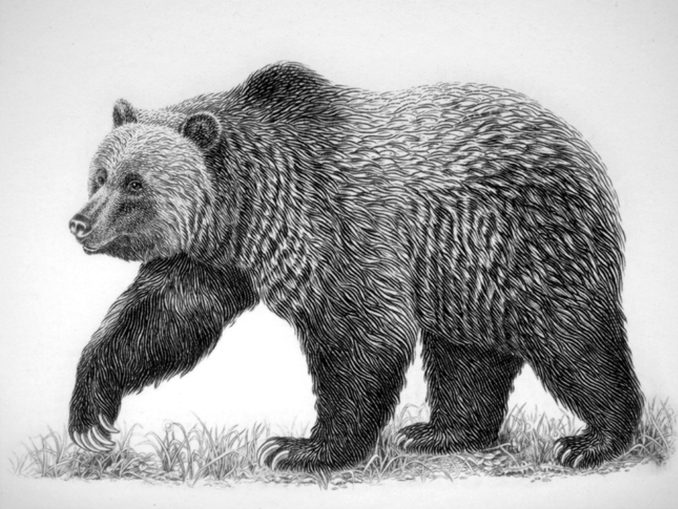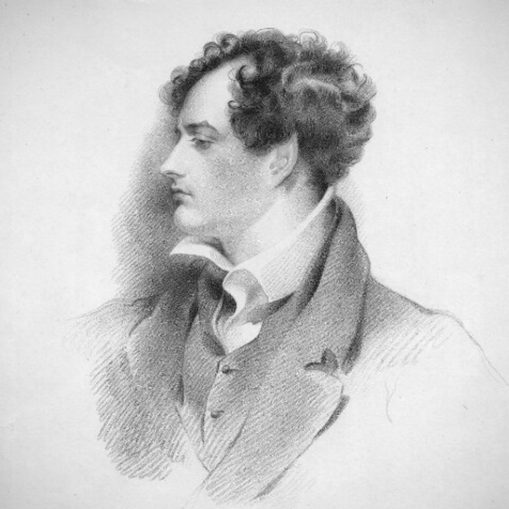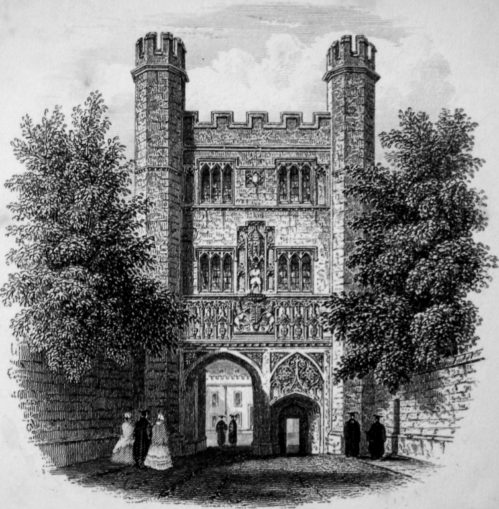
Cambridge, Novr. 6th, 1805.
I did not dance well at the Bonfire Night show on Midsummer Common. Afterwards, Fred said to me, ‘Daisy, me ole dear. Yer knows and I knows yer gettin’ a bit old for this game. An’ I got Bruin, an’ ’e’s learnin’ fast. ’E’s a chip orf the ole block. Now, Daisy, yer bin a good bear an’ a good friend to me all these years, an’ I’ll not see yer starve, I’ll do right by yer. There’s this lord, Byron ’e’s called, ’e’s a student at the university, an’ ’e wants to buy yer. ’E says ’e ain’t allowed to keep a dawg in ’is rooms, but there’s nothin’ in the rules agin ’avin’ a bear. We ’ad a laugh about that. ’E seems a good enough lad, and I think yer’ll be all right. Good lookin’ boy, though ’e’s a mite lame, gave me good money for yer. ’E’s comin’ to get yer tomorrer.’
My mind is all of a turmoil. It has been a good life with Fred, and we have had twelve European dance tours to great acclaim. But what he says is true. I am getting old, as happens to the best of dancing bears, and it is time to settle down. My dear cub Bruin – now two years old, how time passes! – will serve him well. And as for this young lord, we shall see. If he puts a foot wrong, he shall feel my powerful paw and my terrible teeth.
Novr. 7th, 1805.
I am now a Lord’s bear. He is only a Baron – George Gordon, Lord Byron – but I am not a snob about such matters. His friends call him George, and so shall I in this diary.
He came to collect me in a chaise, which showed a certain style. He is quite handsome for a human, with dark brown curly hair, but as Fred said he is lame. There is something wrong with his right foot, which he tries to disguise – as a bear I can well understand that, one must never show weakness.

He has found me a private room in a tower above his own quarters, with a comfortable bed of straw where I can lie at my ease. I have never enjoyed the luxury of a room of my own, but it is a little lonely there.
I had a good dinner with plenty of meat which was perhaps a little over-mature, but we bears are not fussy about such things. He also gave me a large pot of beer. Then we went out for a ramble on what he called ‘the Backs’, a wild garden on the other side of the river from the buildings. Feeling jovial from the beer, and having a corner still left to fill, I caught a cat and ate it. George laughed. He said it was the Master’s cat, but no one would know. Cats disappear the whole time.
On the way back to his rooms, I felt the need to – how shall I say? – answer Nature’s call. This office I performed in a wide paved space which George said was called the Great Court. He also said that they would think it was the Bursar that had done it. This was probably no more than a jest, but who knows in this strange place?
I like George, but I miss my dear Fred.

Novr. 10th, 1805.
George came home this evening shockingly inebriated, with a trollop on his arm. He opened a bottle of port and they shared it before they lurched off to bed together. My lord seems to be able to perform despite being more than three sheets to the wind. Good for him. But it was not a seemly spectacle and I retired to my room in the tower to ponder matters that only bears can understand.
Decr. 2nd, 1805.
I am now well settled into life at Trinity College. George brings me plenty of food, not of the best quality but enough to keep a bear fighting fit. He explained to me that undergraduates are obliged to eat a certain number of dinners in the dining hall each term, but that the food is so disgusting that most of them pay for their dinners as they must but eat in nearby alehouses, so that much food is left over. He sends his manservant to the kitchen and pays the cooks a small amount for the uneaten meat, which he brings to me. I have just disposed of a good deal of what he said was chicken, but the meat is dark grey and I think it is crow. I have had worse and am not disposed to complain.
I spend my days in George’s room, and at night retire to my private chamber. Long ago, Sir Isaac Newton had an observatory on the floor above me, and I like to fancy that he spent many hours looking through his telescope at the Great Bear and wondering whether those distant suns also had planets.
Decr. 8th, 1805.
George was sadly intoxicated again last night. He had an essay to present to his tutor tomorrow, on Ammianus Marcellinus. I looked at his brief and feeble scrawls, and it was plain that they would not do. While he snored, I relit the candle and sat in his chair to write a proper essay for him.
I well remember my visit to Arbon in the Swiss Canton of Appenzell with Fred two years ago. In Roman times this was called Felix Arbor, and old Ammianus – one of my favourite writers – visited it in the autumn of the year 355. He made the curious observation that the Rhine flows into Lake Constance without mixing with the water of the lake, and bores through the lake to flow out at the other end as if it were enclosed in a pipe. Even a bear can understand that this is nonsense. But, standing in the ruins of the old Roman watchtower, now in a churchyard, and looking east from the promontory, I could see how he came by this idea. The river, swollen and muddy with autumn rains, flowed into the lake with great force and left a straight brown track stretching across the blue lake as far as the eye could see.
This I described as well as I could in my essay. When the low winter sun reluctantly crawled above the horizon the following morning, I awakened George – a sadly long business involving much groaning and not a little puking – and pushed him over to his desk to see what I had done. He was astonished and grateful, and hugged me warmly. I made him eat a breakfast of cold mutton washed down with small beer before he limped off pale-faced and unsteady to his tutor, clutching my work. My handwriting is not good, but it is better than his.
The manservant cleaned the floor. Rather him than me.
Decr. 9th, 1805.
George told me that his tutor was mightily pleased by the essay on Ammianus that I had written for him, but had asked how it was that he had seen the Rhine. Luckily George had the presence of mind to stammer out that he had heard it from a friend who had been on the Grand Tour. I think that perhaps the two of us will get him through his course of studies, but it is the bear who will have to bear the burden, as bears do.
Jany. 25th, 1806.
Yesterday evening George returned to his rooms with a boy from the chapel choir, one John Edleston. He plied the lad with Madeira, too strong a tipple in my view for one of such tender years. I will draw a veil over what followed, but suffice it to say that in the Navy such acts may get a man hanged. I flatter myself that, in my travels, I have seen the best and the worst of human conduct, but must confess that I was appalled by the spectacle and retired hastily to my room in the tower. I do have to admit that young John seemed quite cheerful when he left the following morning. Perhaps he is used to such treatment.
Feby. 16th, 1806.
George has been writing poetry. While he was out roistering with his friends I cast an eye over his effusions, and I confess that I am not greatly impressed. Here are two stanzas from one of his poems.
The man, doom’d to sail
With the blast of the gale,
Through billows Atlantic to steer,
As he bends o’er the wave
Which may soon be his grave,
The green sparkles bright with a Tear.
The Soldier braves death
For a fanciful wreath
In Glory’s romantic career;
But he raises the foe
When in battle laid low,
And bathes every wound with a Tear.
Well, I have been aboard a ship in an Atlantic gale and, believe me, the sailors were far too occupied to weep. And I was at the Battle of Marengo, and saw how the victorious French simply skewered their wounded enemies, and laughed as they did so.
George is only young, and if he keeps at it he may yet be a better poet. But I wish he would pay more attention to his studies. I have another essay to write for him this evening, on Xenophon’s Anabasis.
Feby. 17th, 1806.
My essay turned out well, and George returned smiling from his tutor’s room and shook me warmly by the paw. I am getting the knack of writing these pieces.
I commented on the passage in which Xenophon’s men are laid low by wild honey that they have gathered. We bears know that honey made from the flowers of the rhododendron is poisonous, and can instantly identify it by its odour, but humans’ sense of smell is so poor that such discrimination is beyond them. Also, of course, Xenophon would not have been acquainted with this Asian shrub.
George’s tutor had not known what had affected the honey, and was surprised by this revelation. The rhododendron has now been brought to this country, so when the tutor asked George how he knew the cause of the poisoning, he was able to mutter vaguely that it had happened to a friend of his who kept bees and had rhododendron bushes in his garden. Since no other explanation seemed possible, this flimsy story had to be accepted.
June 2nd, 1806.
A visit from George’s stepsister Augusta Leigh. I am sorry to report that their relations are very far from those that one would expect from brother and sister. Not to put too fine a point on it, they spent the night in the same bed. Deeply shocked, I retired early to my private chamber.
The proctor’s cat tells me that this is the sort of behaviour one must expect from the aristocracy, and related some appalling tales which modesty prevents me from setting down here.
Copyright © Tachybaptus 2018
The Goodnight Vienna Audio file
Audio Player



